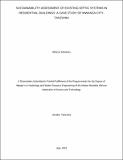| dc.description.abstract | Septic system (SS) is the oldest anaerobic wastewater treatment system still widely employed
today in suburban and urban areas. The sustainability of SS in developing countries, including
Tanzania, is restricted by several constraints (e.g., poor installation and hydraulic overloading
(technical issues), poor resource recovery practices (economic issue), maintenance and awareness
(social issues), etc.). Efforts have been done to improve SSs’ sustainability, but the improvement
is hindered by a lack of information on how to guarantee SSs sustainability mainly, at the
household level. Therefore, this study was aimed to assess the SSs’ sustainability in residential
buildings in Mwanza city, Tanzania emphasizing economic, environmental, technical, and social
aspects. The sustainability assessment (SA) was accomplished by study area and sustainability
indicators (SIs) selection methods, diverse data collection methods, and the Fuzzy-based Indices
Approach (FIA) (data analysis method). The results from SA show that 18 out of 50 indicators
were selected as appropriate indicators for SA of 200 households having SSs in the Nyegezi area.
Also, the entire systems in the city had an index of 0.42 and fall in a danger state. It was concluded
that the SIs assessed were relevant to the studied system. They demonstrate the importance of
matching any set of indicators to the characteristics of the specific sanitation system being
examined. Indeed, corrective measures must be suggested for immediate livelihood improvement
and sustainability considerations. The study provided a tool and framework for assessing the
sustainability of SSs in Tanzania using a set of most 18 relevant SIs. | en_US |

